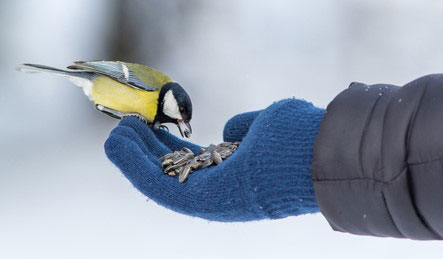
Random acts of kindness
- Minnie Galloway, a crossing guard in Wilmington, NC, buys and gives out warm coats and school supplies to kids who don’t have them.
- Jadav Payeng of India earned the name ‘Forest Man.’ In 1979 he noticed wildlife dying on the banks of a nearby island due to erosion. He started planting a tree sapling every day. Today, a 1,360-acre forest is home to wild animals, birds and plants.
- A seven-year-old boy in England had the idea of stuffing backpacks with supplies for homeless people. His goal was 10 packs, but he gave out 130. A 10-year-old boy, troubled by the homelessness he saw on the streets of Cambridge, Mass., spent his summer passing out handmade lunches from a green wagon he pulled alongside his dad.
- Travel guru Rick Steeves traded his retirement fund into a $4 million apartment complex for homeless women and kids who need housing.
What do all these acts have in common? They started with one person and one idea. They were ideas rooted in generosity, kindness and a desire to make a difference. They grew beyond the original intent. They were contagious, inspiring others.
While not getting nearly as much attention as Valentine’s Day, there’s a ‘Random Act of Kindness’ week every February. Kindness and generosity are great ways to extend the Valentine’s Day love and to accrue a few health benefits, too. Studies show that generosity releases good chemicals like oxytocin, serotonin and endorphins, which help to reduce stress, anxiety and depression and to make both the kindness doer and the recipient feel good.

You don’t have to plant a forest or finance a homeless shelter to make a difference. Random acts of kindness can be simpler than that. Start small and start local. Spread kindness at work, at home and in your community. Make it a habit. Set a goal to perform at least one act of kindness a day.
Here are some suggestions to get you started:
- Pay someone an unexpected compliment.
- Check on an elderly neighbor to see if they need errands or rides.
- Bring freshly baked goods or fresh flowers to share in the workplace.
- Volunteer at a food pantry or homeless kitchen. Organize friends or family to cook a monthly meal.
- Use your skills or energy to help a neighbor or colleague. Fix a computer, change a tire, cook a meal, mow a lawn, or shovel out a car.
- Write a note to someone’s boss complimenting him or her or write a thank you note for good service.
- Double your tips next time you can afford it.
- Call someone you know who recently lost a loved one and tell them you are thinking of them.
- Become an organ donor.
- Bring coupons you aren’t using to the store. Leave them near the products so others can find them.
- In wintry weather, buy warm gloves, hats and socks and give them to homeless people or to shelters.
Kindness costs little but pays much in dividends!
1.800.252.4555 or 1.800.225.2527
View more newsletters at www.theEAP.com
